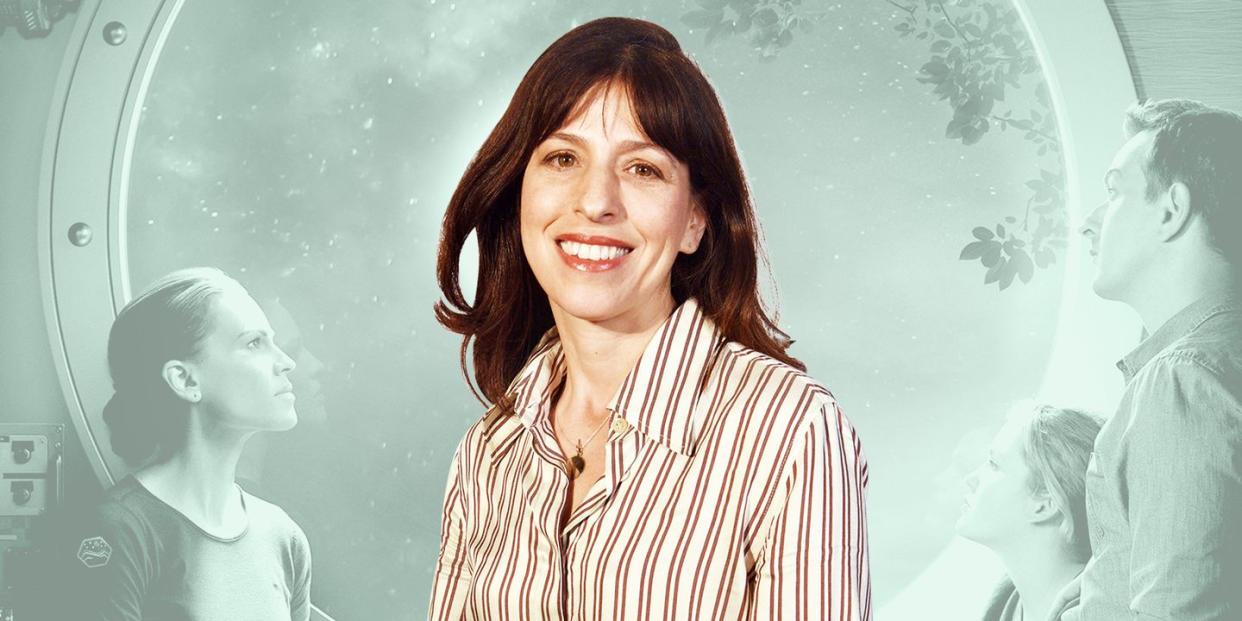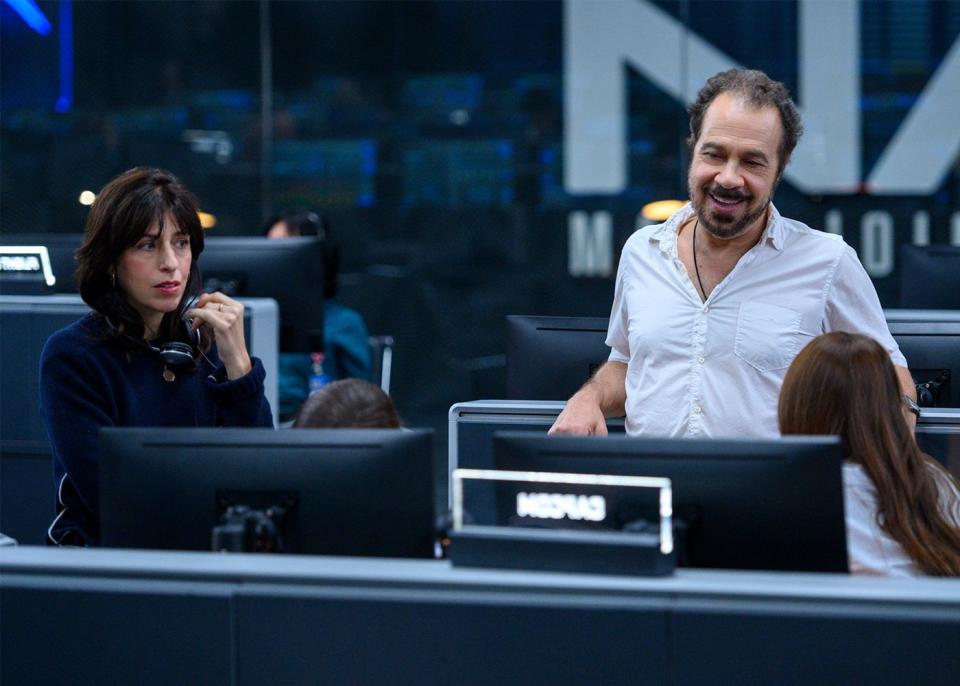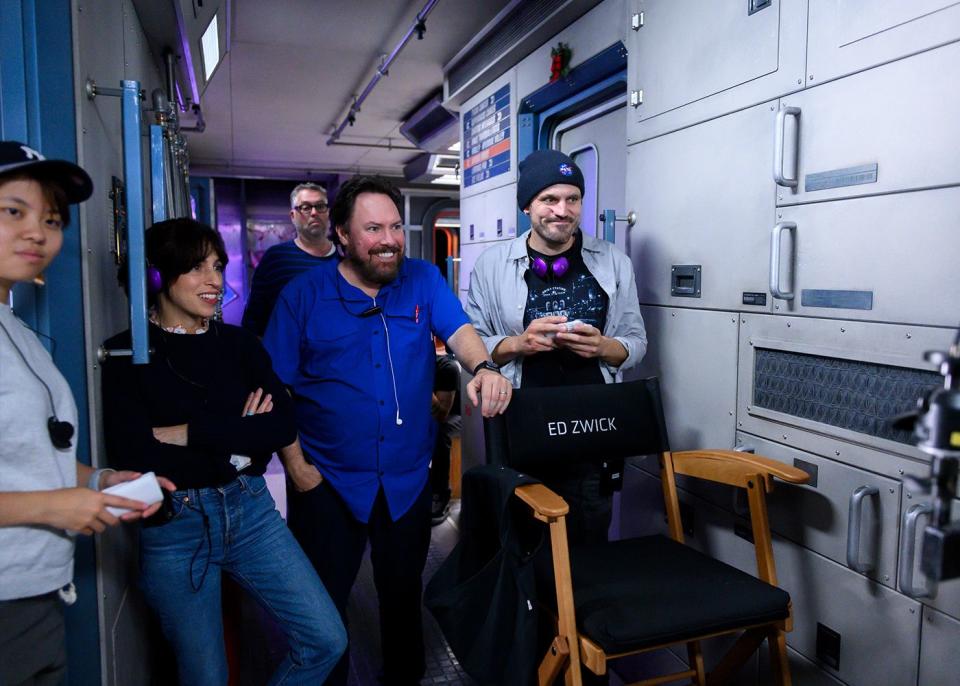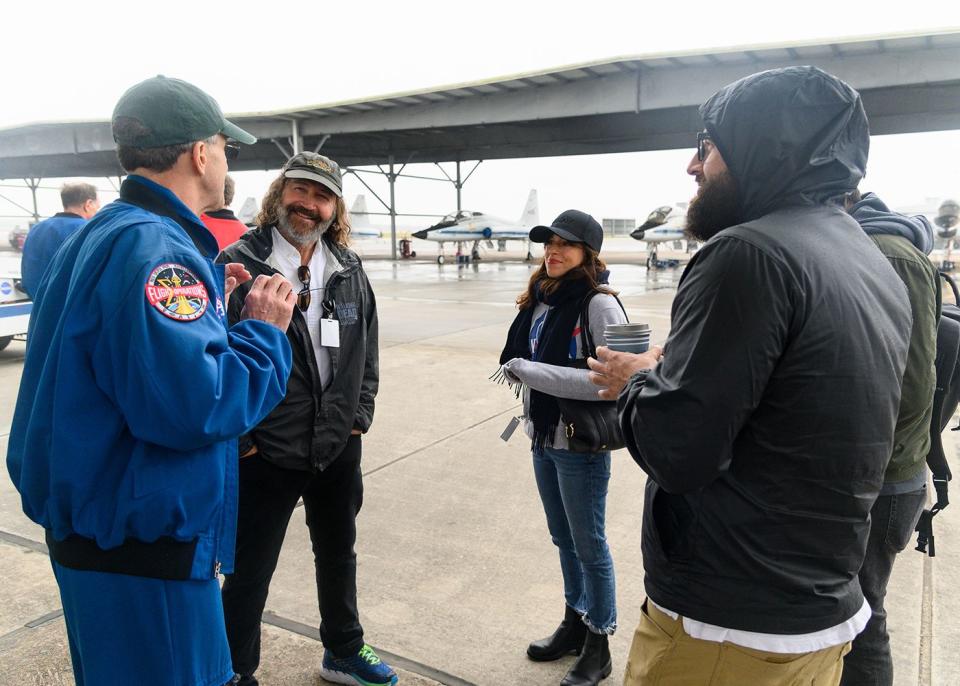Jessica Goldberg Is Ready to Take the Crew of Netflix's 'Away' to the Outer Limits of Mars

In the final moments of Netflix’s Away, the crew of the first (wo)manned mission to Mars touched down on the Red Planet, where they agreed to take that biggest of steps into a bold new future not as nationalistic individuals, but as brothers and sisters in a global society. Unfortunately for viewers eager to see the crew’s continued adventures on Mars, the show ended there, just five minutes into the Atlas Mission’s most pivotal phase. We’ll have to wait until season two to find out what Commander Emma Green and her cohorts experience on Mars, a mysterious landscape full of unknowns.
As of this publication date, Away remains in renewal purgatory, with the fate of a hypothetical season two yet unknown. However, showrunner Jessica Goldberg and her team of writers are nonetheless hard at work, dreaming up new stories for the crew’s long stay in the Red Planet’s inhospitable terrain. Before Goldberg touched down at Away, she created Hulu’s The Path; she also wrote for and produced NBC’s Parenthood. She spoke with Esquire from her home in Los Angeles to fill us in on the fate of season two, as well as share uplifting stories about the outpouring of support from fans around the globe who feel seen and heard by Away.
Esquire: Has Away officially been picked up for a second season?
Jessica Goldberg: No, it hasn’t been. I'm hoping we'll know by mid-October. It’s hard to wait for the news, but in the meantime, Andrew [Hinderaker] and I, as well as some of our writers, are planning. That way, we’re ahead if it does get picked up. The stories we're coming up with for Earth and for Mars are so beautiful and so timely. The more you invest in the storytelling, the harder it is to wait.
ESQ: What can you tell us about those stories you're planning?
JG: One of the things that excites me so much is that this will be the first crew on Mars. The Martian is probably the most realistic Mars movie, but I think there's room for something else. I think about these beautiful characters, who we’ve spent so much time investing in and watching them evolve. Now they're the first people on this planet. We’re attacking the journey the same way we attack season one, which is starting in the real, always. What are the adventures on Mars? What are the harrowing moments? How can these characters continue to grow, and what is the family they make? Of course, the longer you’re away and the further away you are, the more tenuous those relationships with the people on Earth become. This story will continue to strain the tethers between the Mars crew and their families back home.
ESQ: If the show gets picked up again, what sort of challenges do you anticipate production-wise due to the pandemic?
JG: You know what's so interesting? We would have such an easy time with the Mars story, because it's just five people. The actors and actresses can quarantine together. They’re the only people on the planet. That part of the story feels like it will be containable, it seems. It's the Earth scenes that worry me, like when we go to Johnson Space Center, where it’s very crowded, full of energy and people. The Earth stories feel more difficult to me, but the Mars stuff feels strangely contained in a pandemic world.

ESQ: Throughout the first season, I kept thinking to myself, “If they end this without telling whether or not the crew made it to Mars, I'm going to throw my TV out the window.” Was that always the plan to land on Mars, but leave us minutes after?
JG: Yes, it was always the plan to take you there. I'm the same way. If I don't find out whodunnit in a season of a mystery, I'm angry. We always knew we would make it there, and we always had that beautiful idea that the astronauts would decide it wasn't one of them, but all of them who would touch down first.
ESQ: I thought that ending was so beautiful and unexpected. It meshes so well with the show’s themes of globalism and working together across countries and across cultures. Have you heard from viewers in other parts of the world about how this show affected them?
JG: Ray [Panthaki], who plays Ram, has forwarded me many texts from Indian viewers. There’s no Netflix in China, but according to Vivian [Wu, who plays Lu], people have been pirating the show. I’ve been hearing that people in these parts of the world are enjoying watching characters who aren’t stereotyped, to see those stereotypes broken open, so that's been really rewarding.
Ato [Essandoh], who plays Kwesi, is from Ghana, and he said the response was overwhelming. People said, “I can't believe I'm hearing my language, the Fante language, spoken on an American television show.” People in Ghana couldn’t believe it. This was a country that had never heard its language on television before, and they're just so thrilled. It was very special.

ESQ: This show lands at a time when we're watching the government ramp up its efforts to expand the military through the Space Force. Do you have any interest in highlighting the intersection of military and space in another season?
JG: We're more interested in that cross section of the private sector with space travel. That’s something we’re turning over in the writer’s room: what happens if something with monetary value is found on Mars, meaning that this is no longer a purely scientific journey? We haven’t looked at the military because the show posits this other world in which the world came together to support the Atlas Mission. If we twist it in season two, it'll be interesting to watch nationalism come into the picture, because in a way, the journey is about eliminating those borders.
ESQ: It was interesting to watch this show during this moment in history. This show is about the challenge of being apart from your loved ones, and so many of us have been apart from our loved ones for many months. I watched it with my parents when we reunited for the first time in five months, and it felt so meta to watch this show about being apart when we were finally together. Have you heard from many viewers about the particular resonance of the show during the pandemic?
JG: That makes me so happy. There have been a lot of tweets about people feeling very moved by that element, feeling that in their own lives, but then of course, commenting on our cell connections. They only wish they had as good as cell connection as the show does.
We got so lucky. We finished shooting in February, I came back to LA, and then suddenly three weeks later, the world shut down. Then I was editing the show in my bed by myself, but my daughter would crawl into bed, and she would watch the episodes with me. It was very meta, particularly Episode Four, when Ram has a virus in space and they're all wearing protective gear. The state of the world brought a whole new awareness to what we had written. Then we’d watch these moments where Emma is talking to her husband at home. For two weeks, that's how I was talking to my mother until we decided to integrate. It was such crazy timing for this show.
ESQ: What surprised you about making this show?
JG: For me, because I came to space as a real novice, the humility of being part of a universe is something I never understood until I started working on the show and talking to people at NASA. This theme of boundaries disappearing—this is an experience called the overview effect, which astronauts talk about experiencing when they're on the Space Station. They look down at Earth and they don't see any boundaries; they just see one planet. I've experienced a deeper appreciation for looking up. I spent so much of my life as a writer looking at human beings and at the Earth, so it was a real shift to look up.

ESQ: How much research went into Away? Was there much consultation with astronauts and NASA engineers?
JG: Yes, absolutely. We were so lucky to have so much support from NASA. They really responded to the show right away. Mike Massimino, who's been in space many times, became our consultant. The compliment he gave us was that when he read the script, it reminded him of being a kid and wanting to be an astronaut; he felt that maybe the show could do that for the next generation. Obviously we're writing a TV show, so we had to take lots of liberties—like for instance, that time gap between phone calls, you can't really play the delay in real time on television. Of course there are other liberties that you take when you're doing a TV show, but we really tried to ask NASA or ask astronauts, “Is this at least rooted in the real?”
In fact, when Hilary Swank came in after we had offered her the show, she said, “My dream was to be an astronaut.” In Episode Seven, when young Emma’s mom saved up and bought her a telescope that didn’t work, that was Hilary’s story. It was so moving that she had actually experienced that, and that going to space was one of her dreams. I guess that's the great thing about being an actor—now she gets to do it.
ESQ: What were some of the biggest challenges of making Away?
JG: The technical elements were a real challenge. In Episode Two, there's this space walk, for example. Most of the shows I worked on before Away were about putting people in a room, where they’d have a fight or cry. But for a space walk, what do you build? What sets do you need? How do you, for this amount of money, make it feel like we’re in space? I love talking to Hilary and Ray about the space walk in Episode Nine, where the ice crystals are floating around them. All that's built is a small piece of the outside of the ship; otherwise, there's nothing there. There's just cameramen and stunt doubles and safety people; you're looking into the face of the cameraman. There's actually nothing floating in space. All those technical pieces were very complex—they took hours of conversations and the pooling of really wonderful minds. Our production designer was phenomenal, as were the special effects people on the show. The sheer collaboration of Away was much more complex than anything I had worked on before.
ESQ: Away does such an excellent job of spotlighting the hardships of living with CCM. Have you heard much from the CCM community about their reaction to the show?
JG: This is the really beautiful thing about a writer's room. I had an assistant for three years named Paola Limon; she has CCM and her father has CCM. Early in the process, we were struggling to identify a disease Matt could have that could go unnoticed. She said, “I have this thing.” It was so deeply personal to her, that story; she's had to have multiple lesions removed. I think the reason why it speaks to so many people is because it’s coming from someone who literally is living through it. Paola has forwarded us many lovely emails from her support group.
There are so many aspects of this show that have been rewarding. I've gotten messages from wheelchair users like saying, “I love Matt's wheelchair. Do you know what model it is?” This is the power of television. You have lofty ideas in the writer's room and you're mostly trying to entertain people and take them out of their lives for an hour, but this show transcended that with these moments. People have felt heard and seen, which is very exciting.
ESQ: Ultimately, what do you hope that people take away from Away?
JG: We started the show almost two years ago, and it seems like the world has only gotten more nationalistic and less collaborative. I just hope the dream of the show is felt. I hope people start to find that, if we work together, if we look up, maybe we can change the world.
You Might Also Like

